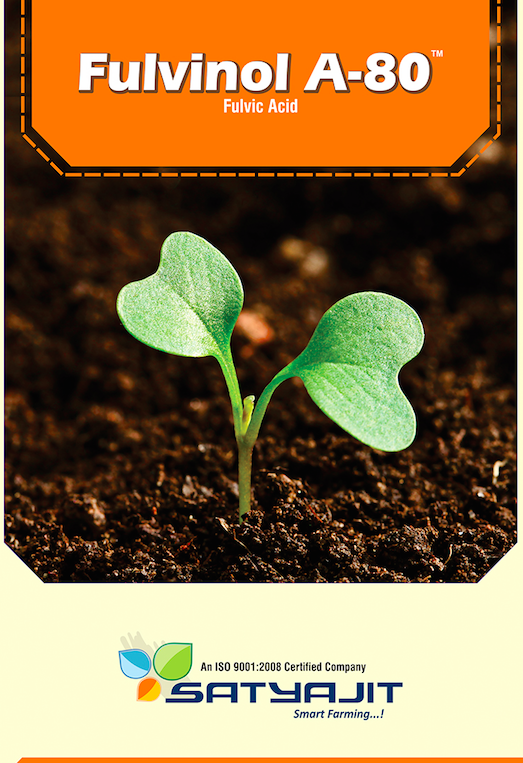₹799.00 – ₹9,999.00
Fulvic Acid
Fulvic acid is a most valuable input in biological agriculture. It can provide a multitude of benefits for to both soil and plant. Advantages include:
- It is non-toxic.
- It is a powerful organic electrolyte.
- It enhances cell division and elongation. Root growth is magnified with obvious benefits.
- As a foliar spray, fulvic acid increases the plant’s oxygen uptake capacity with an associated increase in chlorophyl production and an increase in the permeability of plant membranes, improving the uptake of nutrients.
- It has a unique capacity to dissolve minerals and trace elements. This feature has tremendous import for fast-tracking the plant availability of rock minerals, i.e., rock phosphate and lime.
- Can interact with sunlight to enhance photosynthesis. This can be particularly valuable during prolonged cloudy periods.
- Can absorb a part of the harmful UV radiation. This property is also used to delay the decomposition of UV unstable active substances such as Pyrethrum.
- Fulvic acid is a potent, natural chelating agent, slowing oxidation and converting metallic elements into readily absorbable, bio-available nutrition with very small molecular size allowing fulvic-chelated minerals rapid entry through plant cells.
- Fulvic acid offers drought protection, due to improved moisture storage
- Fulvic acid can detoxify pollutants in the soil. They absorb toxins (reducing soil-life damage) and catalyze their rapid breakdown.
- Fulvic acid dissolves silica and magnifies the many benefits of this element.
- Fulvic acid is responsible for an increase in stomata opening and transpiration and assists plant respiration as well as improving the respiration of beneficial micro-organisms.
- Fulvic acid directly influences numerous enzymatic processes and stimulates the plant’s immune system.
Benefits of fulvic acid:
- enhanced seed germination & growth
- improved development of roots and shoots
- increased resistance to fungal attack
- enhanced uptake of nutrients
- increased plant metabolism of proteins
- chelation effects plant growth cycle
- increased activity of multiple enzymes
- enhanced permeability of cell membranes
- enhanced cell division and elongation
- increases synthesis of new minerals
- breaks down inorganic substances
- aids in the creation of fertile new soils
- pH buffering capacity-soluble in acid & alkaline soils
- scavenges heavy metals
- increases growth and yield of crops
- aids chlorophyll synthesis
- balances plant chemicals
- improves plant respiration
- detoxifies various pollutants
SPECIFICATIONS :
Fulvic Acid – 80%
Moisture – < 10.0%
pH – 5.0 to 6.0
Solubility – 99%
APPLICATION RATES :
Fertigation: 500gm per acre.
Foliar: 1 to 2 gm per Ltr of water.
Description
Fulvic acid is a most valuable input in biological agriculture. It can provide a multitude of benefits for to both soil and plant. Advantages include:
- It is non-toxic.
- It is a powerful organic electrolyte.
- It enhances cell division and elongation. Root growth is magnified with obvious benefits.
- As a foliar spray, fulvic acid increases the plant’s oxygen uptake capacity with an associated increase in chlorophyl production and an increase in the permeability of plant membranes, improving the uptake of nutrients.
- It has a unique capacity to dissolve minerals and trace elements. This feature has tremendous import for fast-tracking the plant availability of rock minerals, i.e., rock phosphate and lime.
- Can interact with sunlight to enhance photosynthesis. This can be particularly valuable during prolonged cloudy periods.
- Can absorb a part of the harmful UV radiation. This property is also used to delay the decomposition of UV unstable active substances such as Pyrethrum.
- Fulvic acid is a potent, natural chelating agent, slowing oxidation and converting metallic elements into readily absorbable, bio-available nutrition with very small molecular size allowing fulvic-chelated minerals rapid entry through plant cells.
- Fulvic acid offers drought protection, due to improved moisture storage
- Fulvic acid can detoxify pollutants in the soil. They absorb toxins (reducing soil-life damage) and catalyze their rapid breakdown.
- Fulvic acid dissolves silica and magnifies the many benefits of this element.
- Fulvic acid is responsible for an increase in stomata opening and transpiration and assists plant respiration as well as improving the respiration of beneficial micro-organisms.
- Fulvic acid directly influences numerous enzymatic processes and stimulates the plant’s immune system.
Benefits of fulvic acid:
- enhanced seed germination & growth
- improved development of roots and shoots
- increased resistance to fungal attack
- enhanced uptake of nutrients
- increased plant metabolism of proteins
- chelation effects plant growth cycle
- increased activity of multiple enzymes
- enhanced permeability of cell membranes
- enhanced cell division and elongation
- increases synthesis of new minerals
- breaks down inorganic substances
- aids in the creation of fertile new soils
- pH buffering capacity-soluble in acid & alkaline soils
- scavenges heavy metals
- increases growth and yield of crops
- aids chlorophyll synthesis
- balances plant chemicals
- improves plant respiration
- detoxifies various pollutants
SPECIFICATIONS :
Fulvic Acid – 80%
Moisture – < 10.0%
pH – 5.0 to 6.0
Solubility – 99%
APPLICATION RATES :
Fertigation: 500gm per acre.
Foliar: 1 to 2 gm per Ltr of water.


Reviews
There are no reviews yet.